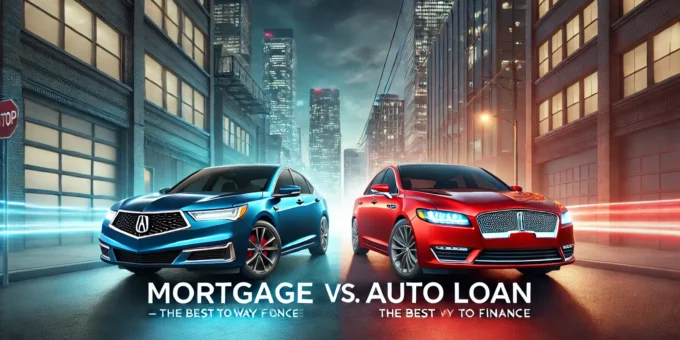
Luxury cars are more than just vehicles—they are symbols of prestige, innovation, and engineering excellence. However, financing such a high-end purchase requires careful financial planning. While auto loans are the traditional method, some buyers consider using a mortgage or home equity to fund their purchase. But which option is the best?
This guide breaks down mortgage vs. auto loan financing for a luxury car, comparing interest rates, loan terms, tax benefits, and financial risks. By the end, you’ll have a clearer understanding of which financing route aligns with your financial goals.
Understanding Auto Loans
Auto loans are secured loans where the car itself serves as collateral. If you default, the lender can repossess the vehicle. These loans typically have shorter repayment terms (3 to 7 years) and higher interest rates than mortgages.
Key Features of Auto Loans
- Loan terms: 36-84 months
- Interest rates: Typically higher than mortgages
- Down payment: 10-20% recommended
- Secured by the vehicle
- No impact on homeownership or equity
Auto loans work best for buyers who want a structured, quick repayment plan with minimal risk to other assets.
Understanding Mortgages for Car Purchases
A mortgage is a long-term loan secured by real estate. Some homeowners tap into their home equity or refinance their mortgage to buy a luxury car.
Key Features of Using a Mortgage for a Car
- Lower interest rates than auto loans
- Loan term: 15-30 years (longer repayment)
- Requires sufficient home equity
- Tax-deductible interest in some cases
- Risk of foreclosure if payments are missed
Using a mortgage for a car can work well for those with significant home equity who want lower monthly payments. However, the long repayment period may lead to paying more interest over time.
Comparing Mortgage vs. Auto Loan for a Luxury Car
| Factor | Auto Loan | Mortgage/Home Equity Loan |
|---|---|---|
| Interest Rate | Higher (4-10%) | Lower (3-7%) |
| Loan Term | 3-7 years | 15-30 years |
| Collateral | Vehicle | Home |
| Monthly Payments | Higher | Lower |
| Risk Level | Repossession | Foreclosure |
| Tax Benefits | None | Possible mortgage interest deduction |
| Best For | Short-term affordability | Long-term, low-interest financing |
Interest Rates: Which One Costs Less?
Mortgages typically have lower interest rates than auto loans. However, because they are repaid over a longer period, you may pay more in interest overall.
For example, financing a $100,000 luxury car:
- Auto Loan (5 years, 7% APR) → $23,966 total interest
- Mortgage Refinance (20 years, 4% APR) → $45,585 total interest
While monthly payments are lower with a mortgage, you could end up paying more over time.
Loan Terms: Short vs. Long-Term Impacts
Auto loans have shorter repayment terms, meaning higher monthly payments but lower total interest. A mortgage extends payments over decades, potentially leading to negative equity—where you still owe money long after the car depreciates.
Down Payments and Equity Considerations
- Auto loans require a cash down payment (10-20%).
- Mortgages let you use home equity, avoiding a large cash payment.
- Tapping into home equity can be risky, as your house is collateral.
Risk Factors: Secured vs. Unsecured Debt
Auto loans only affect your car—if you default, the lender repossesses it. Mortgages, however, put your home at risk. This is a crucial consideration for those relying on home equity.
Alternative Luxury Car Financing Options
If neither a mortgage nor auto loan is ideal, consider:
- Leasing – Lower monthly payments, but no ownership
- Personal loans – Higher rates, but no collateral
- Business financing – If using the car for work, some tax benefits may apply
Best Scenarios for Each Loan Type
When to Use a Mortgage:
- You have significant home equity.
- You prefer lower monthly payments.
- You want potential tax benefits.
When to Use an Auto Loan:
- You want a faster payoff.
- You don’t want to risk your home.
- You prefer structured vehicle financing.
FAQs on Mortgage vs. Auto Loan for a Luxury Car
Is it smart to use a mortgage for a car?
Only if you have substantial equity and plan to keep the car long-term.
Can I write off car payments if I use a mortgage?
Possibly, but only if the mortgage interest is tax-deductible.
Which option has better rates?
Mortgages generally have lower interest rates but longer repayment periods.
Is leasing better than financing?
Leasing can be cheaper upfront but lacks ownership benefits.
You Can Also Read : Exclusive Mortgage Loans for the World’s Most Expensive New Cars
Choosing between a mortgage vs. auto loan for a luxury car depends on your financial goals, risk tolerance, and repayment preference. While a mortgage offers lower rates, an auto loan provides faster payoff and less risk to your home. Analyze your budget and long-term financial plans before making a decision.
